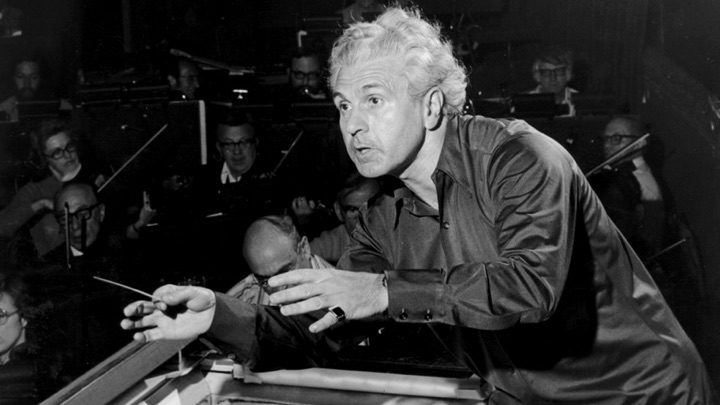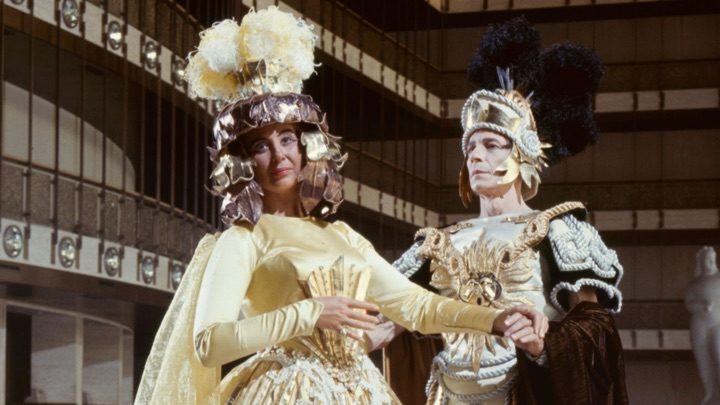
Though cumbersome to navigate, the annals in Martin Sokol’s 1981 edition of The New York City Opera: An American Adventure contain every performance of the Rudel regime. It’s easy to spend hours marveling at the kaleidoscope of works performed and the singers he introduced to New York.

The teaming of Rudel/Sills/Treigle continued until 1972 when they performed in a new production of Hoffmann which would prove to be the bass-baritone’s last appearances with the company prior to his tragic death in early 1975 at just 47. Hoffmann would also be their second and final commercial recording together, though Rudel and Treigle would collaborate on the singer’s other major studio effort, Boito’s Mefistofele. On the other hand, the conductor and Sills recorded together often: I Puritani, Louise, Rigoletto, Manon, Anna Bolena, and The Merry Widow, along with a collection of Viennese bonbons and duets with Sherrill Milnes.
Close friends will be surprised at the inclusion today of the Gounod work as it’s an opera I regularly disparage. Though I’ll still never love Faust, Rudel and his company of City Opera stalwarts including Frances Bible, Muriel Greenspon and Dominic Cossa make a pretty convincing case for it, although one might argue that Sills is at moments a bit light for Marguerite.
Faust, it turned out, was one of the two works that I heard Rudel conduct at the Met where he made a surprise debut in 1978 substituting for an ailing Richard Bonynge to lead his former protegé Domingo and Elena Obraztsova in Werther. As his City Opera tenure ended before I began coming to New York, I first encountered Rudel at the Met in Mozart: a rather ordinary 1984 Entführung made most memorable by Francisco Araiza’s ardent Belmonte and Catherine Malfitano’s unfortunate Konstanze. His Met Faust, on the other hand, was strongly cast with Renée Fleming, Richard Leech and Samuel Ramey (all of whom had begun at City Opera although only Ramey overlapped with Rudel). Despite their best efforts and those of Dmitri Hvorostovsky, I didn’t have an especially good time.
After having run the pesky company across the plaza, Rudel probably never expected to conduct over 260 Met performances spanning more than a quarter of a century. Examining its archives, one notes that the Met didn’t treat Rudel with any special attention; he led lots of routinely-cast Puccini and Mozart revivals but only one new production, Handel’s Samson for Jon Vickers in 1985.
I retain a special fondness for Rudel’s Handel dating back many years. When I was around 12 years old, I discovered the RCA Cesare LPs at the library and I listened to them obsessively. They set me on the path to becoming a card-carrying 18th century opera fan. Today I realize the jarring extremes in that Cesare edition: rearrangements, cuts, transpositions, etc. but even now I enjoy it nearly as much as when I first heard it. Sills’s Cleopatra remains one of her most satisfying portrayals, and I still relish Treigle’s noble, agile Cesare when I know I shouldn’t since the composer meant the role for an alto, not a bass-baritone.
In addition to today’s three complete operas, I’m including a tiny morsel of Treigle’s Cesare that never made it into the commercial recording. At the September 27, 1967 opening, he sang “Se in fiorito almeno” directly after Sills’s “Piangerò,” neither of which belong in the first act. His aria is mercilessly abridged but many Treigle fans may have never heard it.
After I bought my reel-to-reel tape player in high school, among the first “pirates” I bought were Rudel conducting Sills in their two other Handel collaborations. I posted the wonderful Caramoor Semele co-starring Léopold Simoneau on Trove Thursday in 2015, but this week I couldn’t resist including the Kennedy Center Ariodante co-starring a sublime Tatiana Troyanos (who was a replacement for the originally announced Shirley Verrett). From today’s more enlightened perspective, it, like the NYCO Cesare, is a musicological horror, but it remains nonetheless an endearing two hours.
I hope to offer another quite special Rudel performance before the end of 2021!
Rimsky-Korsakov: Zolotoy Petushok (The Golden Cockerel/Le Coq d’Or) in English
New York City Opera
21 September 1967
In-house recording
Queen of Shemakha — Beverly Sills
The Golden Cockerel — Joan Summers
Amelfa — Muriel Greenspon
King Dodon — Norman Treigle
The Astrologer — Enrico Di Giuseppe
Prince Guidon — Nico Castel
Prince Afron — David Rae Smith
General Polkan — Noel Tyl
Conductor — Julius Rudel
Gounod: Faust
New York City Opera
26 October 1968
In-house recording
Marguerite — Beverly Sills
Siebel — Frances Bible
Marthe — Muriel Greenspon
Faust — Michele Molese
Mephistopheles — Norman Treigle
Valentin — Dominic Cossa
Wagner – William Beck
Conductor — Julius Rudel
Handel: Ariodante
Kennedy Center
14 September 1971
In-house recording
Ginevra — Beverly Sills
Dalinda — Veronica Tyler
Ariodante — Tatiana Troyanos
Lurcanio — Charles Bressler
Polinesso — Donald Gramm
Il Re di Scozia — Philip Booth
Odoardo — Ryan Edwards
Conductor — Julius Rudel
Handel: Giulio Cesare—exc.
New York City Opera
27 September 1966
In-house recording
Giulio Cesare — Norman Treigle
Conductor – Julius Rudel
Le Coq d’Or, Faust and Ariodante can be downloaded by clicking on the icon of a square with an arrow pointing downward on the audio player above and the resulting mp3 files will appear in your download directory.
Julius Rudel can also be heard on Trove Thursday conducting an NYCO Der Fliegende Holländer with Johanna Meier and Guillermo Sarabia, as well as Goldmark’s Die Königin von Saba with Anja Silja, Sabine Hass, Siegfried Jerusalem and Wolfgang Brendel from a concert in his home town of Vienna.
In addition, more than 400 other podcast tracks are always available from Apple Podcasts for free, or via any RSS reader.
The archive which lists all Trove Thursday offerings in alphabetical order by composer was up-to-dated in late December.



